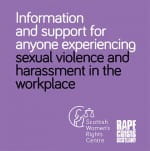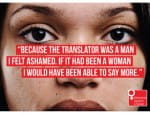News

RCS launches new publication on sexual violence and harassment in the workplace

Rape Crisis Scotland and the Scottish Women’s Rights Centre have produced a new leaflet called ‘Sexual Violence and Harassment in the Workplace’. It sets out practical steps someone can take to improve their safety, explains legal rights, employers responsibilities and where someone can access support and information.
Research project on early sexual abuse among ethnic minorities in Scotland
A project based at Edinburgh University is looking to speak with adult survivors of childhood sexual abuse (18 years or older) from any of the Scottish ethnic minorities, and their friends and families.
They aim to find out what has helped BME survivors in Scotland to get through their childhood experiences, and the services they have or would like to have had to help them better.
The researchers hope to produce a short documentary summarising the ways that helped survivors most. They aim to highlight the services available to help adult survivors of childhood sexual abuse within the ethnic minorities, and to emphasise the gaps in services.
You can take part if you are 18 years of age or older, male or female, from any of the ethnic minorities in Scotland.
Taking part would involve a short interview of 30 - 45 minutes. An initial meeting would be conducted to explain the project in detail and address concerns or questions if any before you give your consent. Your privacy and confidentiality will be completely protected. Anything you share will remain completely anonymous. No identifying information would be revealed in the documentary or associated documentation.
Researchers will also ensure that interviewees have appropriate support available to them if required during or after the interview.
To volunteer for this project, please email: docuprojectjn@gmail.com or contact: Javita at 07404523730 Nauman at 07429589718
'Do you know' performance for Cross Party Group

A group of young people from Leith Academy performed an excerpt from their 'Do you Know' Theatre piece at the Cross Party Group on Violence Against Women earlier this week.
They talked about the powerful learning and the changes experienced since being part of the sexual violence prevention workshops run by Nadine Jassat, prevention worker at EWRASAC. This is part of Rape Crisis Scotland's National Sexual Violence prevention work, now running from 10 Centres across the country.
Sexual Violence against women aged 60 and over: research study
A research study is underway at Durham University which aims to create a better understanding of the impacts of rape and sexual assault against women aged 60 and over: this is an under-researched area internationally. Principal researcher Hannah Bows says "It is critically important that we listen to the voices of women who have experienced sexual violence. I am interested in hearing about the experiences of women and what support they were offered or would have liked to have been offered, in order to better inform specialist support organisations."
Information for anyone interested in taking part in the study
The researchers are seeking women aged 60 or over who have experienced sexual violence to participate in a one hour interview. Interviews will focus on the impact such experiences have had on the woman's life, whether she received any support from agencies, what support she wanted or needed and the extent to which she feels she received that support.
Interviews will be conducted between January 2015 and July 2015.
Interviews will be confidential and all contributions made during the interview will be anonymised.
Interviews will take place at a time and place convenient to women taking part, or over the phone.
To find out more information or to arrange an interview, please contact Hannah Bows:
Email: Hannah.Bows@durham.ac.uk or Telephone: 07964 003062
Latest posts
- Rape Crisis Scotland chief executive steps down after 24 years
- Our response to Lord’s Advocate’s letter
- We talk a lot about the rise of rape and sexual violence, let’s talk about how to stop it
- Statement: Supreme Court ruling on Daly v HM Advocate; Keir v HM Advocate
- An open letter: Women against the Far Right Scotland
